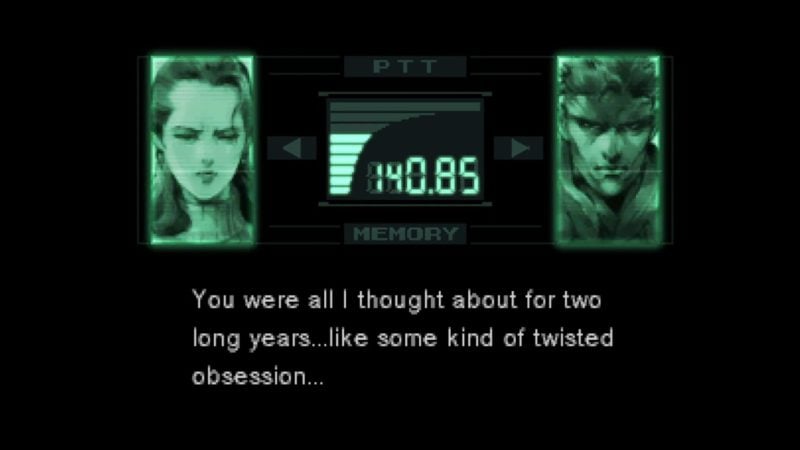Metal Gear, a moniker that many gamers associate with nostalgia, is once again in the spotlight. On October 24, the Metal Gear Solid: Master Collection Vol. 1 will be released, bringing back old favorites including Metal Gear, Metal Gear Solid 2: Sons of Liberty, and Metal Gear Solid 3: Snake Eater. There is a twist in the story, though, as GamesRadar+has revealed: a content warning. A common theme emerges as each game in the collection plays out: “This game incorporates expressions and concepts that may be deemed old… Players are recommended to use caution.

The 90s were a crazy time when scenes like this one from the first Metal Gear Solid didn’t even generate a tiny bit of controversy even when the game was accessible to kids at the time.
What justifies this disclaimer given the enormous changes in societal norms that have occurred since the 1987 release of the first Metal Gear game? In the era of fast “cancel culture,” are we at the beginning of a huge social conversation or is this only a precaution?
There are various theories, and many of them point to the representation of female characters and the constant mention of smoking as aspects of the series that might look dated. Of course, those who are cynical and critical will point out that it’s because the game hasn’t received any performance changes, as was disclosed earlier this week.

Further investigation reveals that the Metal Gear Solid series hasn’t shied away from controversy. Whether it be the incestuous elements in the origin of Otacon or the game’s regular racy and lighthearted tone. The times in which Snake flirts openly or Dr. Naomi’s proposal for a “strip search” once the operation is finished are both provocative in and of themselves. Nevertheless, they reflect the culture of the eras in which they were created as well as Kojima’s unique storytelling style. These themes, along with advertisements for products like the Playboy, iPods, and even Monster energy drinks, demonstrate Kojima’s propensity for shocking the player and his deliberate choice to add a dash of truth to his fictional worlds.
Fundamentally, the disclaimer’s inclusion is a reflection of a more diverse industry. Similar to how Warner Bros. prefaced some Looney Tunes films from the golden age, which are sometimes viewed as racist in modern situations, Konami‘s proactive approach is commendable. It represents a recognition that media consumption out of context might support antiquated ideas. The video game industry behemoth seems to be saying that while art must be maintained, it should also be appreciated within its original context by maintaining the original content’s integrity while underlining its historical context.
This raises doubts about the impending Metal Gear Solid Delta: Snake Eater remake, which is impossible to dispute.
Get our newest content first by following Xfire on Google!

Would the remake preserve this respect to the original story, as the Master Collection does, or would it vary to appeal to modern sensibilities? Striking a balance between staying authentic to the original and making sure the game doesn’t reinforce negative preconceptions is a problem for Konami, especially without Kojima.
There is also the issue of intentionality. A poignant character development highlighted by Kojima’s style of storytelling is Snake’s shift from lusting after Eva to genuinely respecting her. However, it’s simple to understand how such stuff could be misinterpreted when taken out of context. It highlights the controversy over whether art should change to reflect shifting society norms or stay a testimony to the time it depicts.
Konami’s is a recognition that the media of the past, when consumed as is, might unintentionally reinforce antiquated attitudes in the digital age, when indignation can be quick and merciless. However, it’s important to keep in mind that, despite Kojima’s creative genius, the Metal Gear Solid series is a product of its time as much as it is.

The Metal Gear Solid: Master Collection Vol. 1 serves as a somber reminder with its blend of nostalgia and warnings. A reminder that although art is timeless, interpretations change throughout time, and that is where both producers and consumers have power and duty.
